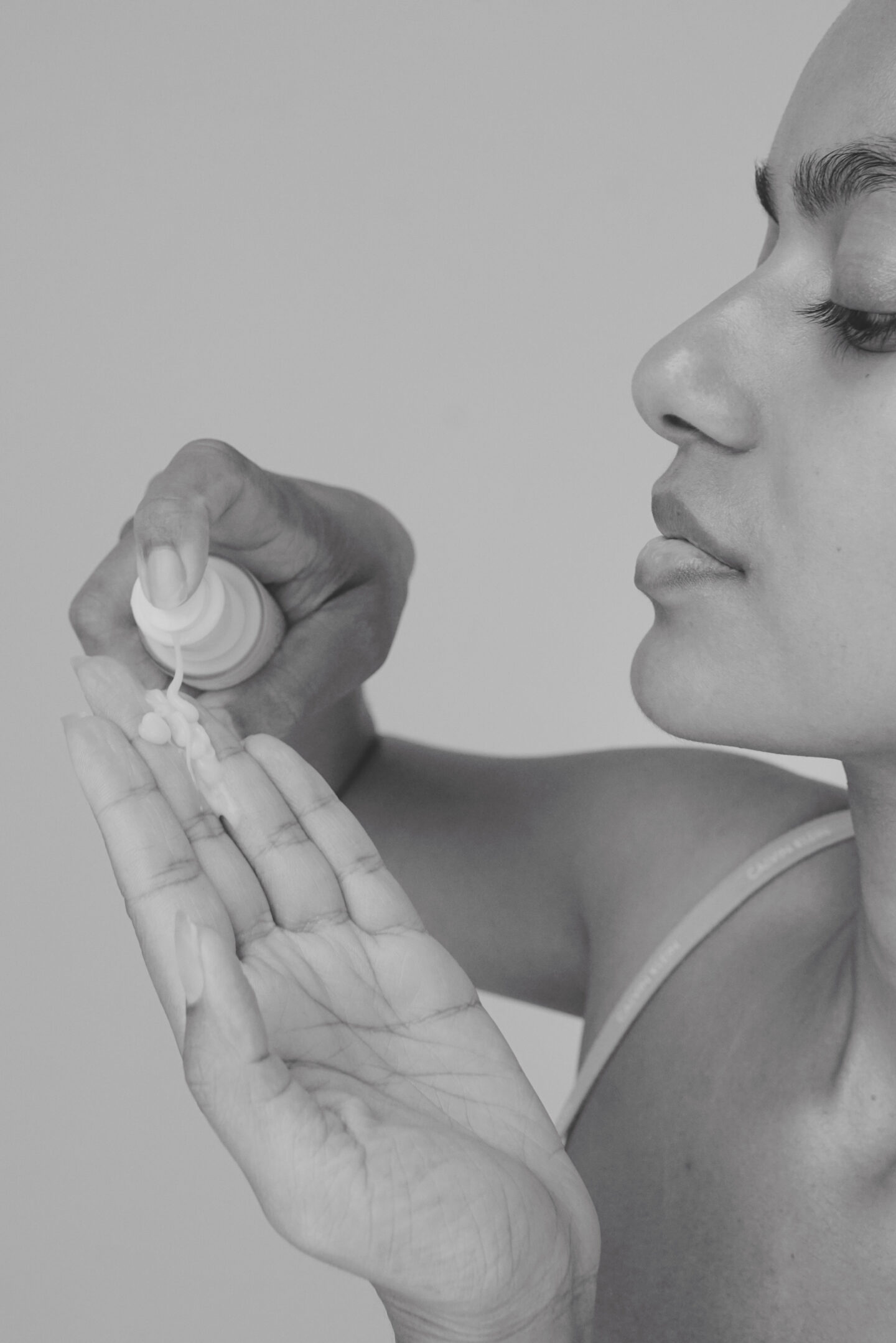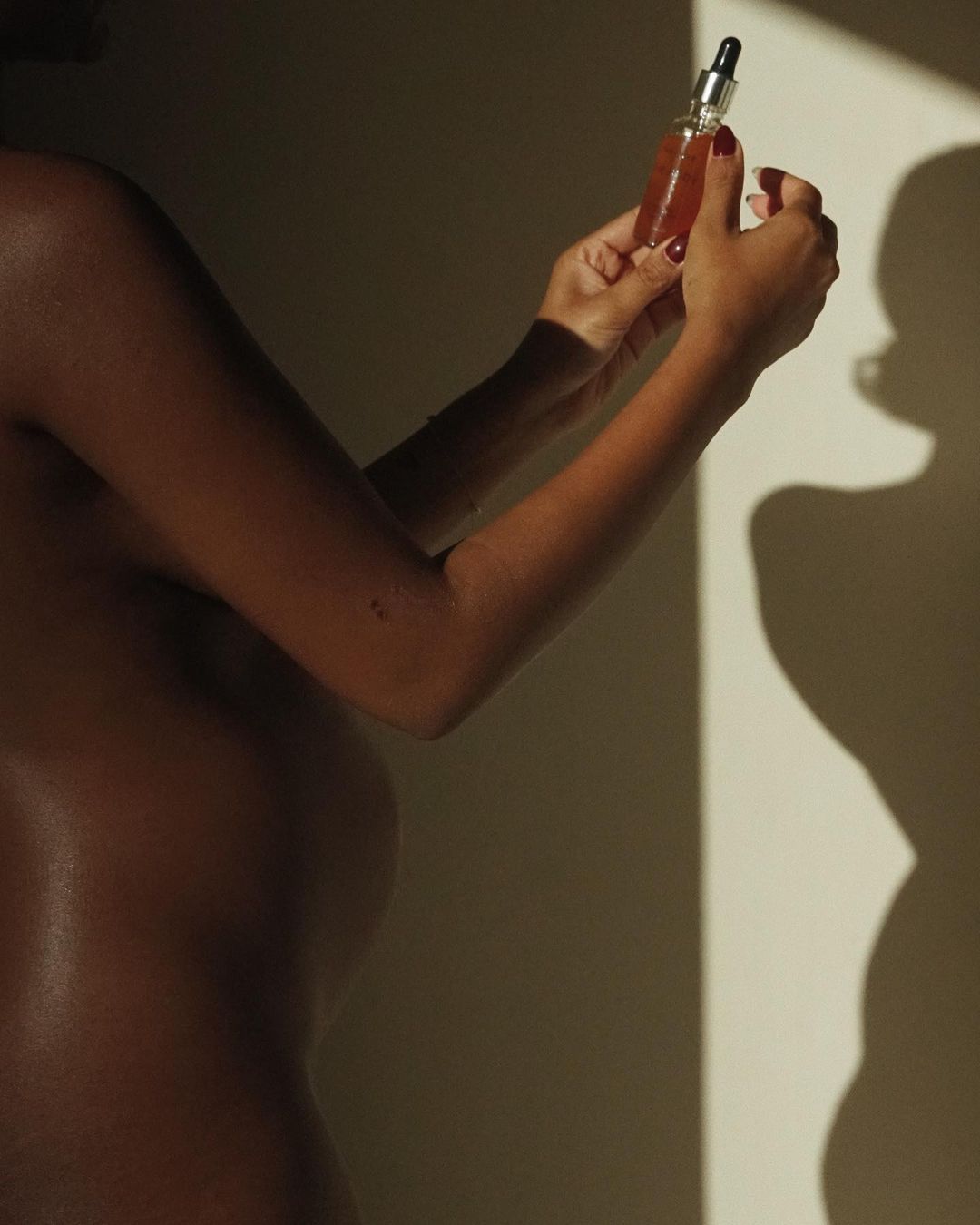Our bodies change so much week over week during pregnancy; this includes our skin.
Changes in hormone levels can result in skin sensitivities, acne or melasma. It’s important to know which ingredients are safe versus harmful but theres some confusion and misunderstanding surrounding what’s considered safe. In this post, I break down ingredients to be weary of and others that are beneficial.

When looking at what products are considered harmful or safe during pregnancy, a lot has to do with absorption. With skincare, a certain ingredient may be considered harmful, but this depends on how much is absorbed through the skin. This is why oral acne prescriptions are to be avoided (greater absorption) while topical treatments (in small doses) are safe. This also based on personal preference and what each individual is comfortable with when treating their own skin concerns. As always, clean and natural products are better for our bodies + skin.
Retinoids, Retinol, Tretinoin (Vitamin A):
There seems to be a lot of misunderstanding and confusion when it comes to using retinol while pregnant. This has a lot to do with synthetic retinol prescriptions (like Accutane) that have associated pregnancy risks. It also has to do with studies on excess amounts of Vitamin A and risks towards the baby and liver.
For these reasons, retinoids are considered harmful if consumed orally – this includes acne prescriptions.
Using retinol topically on the skin has not been proven harmful to the baby. It’s best to see if the retinol (Vitamin A) is natural or plant derived. If so, this retinol is considered safe in small amounts.
Acids
Acids includes BHA and AHA used in many products like cleansers or toners to treat redness, inflammation or acne. Salicylic acid, Benzoyl peroxide, and Glycolic acid have low absorption rates when applied to the skin in small amounts. Doctors don’t recommend using these acids frequently while pregnant — they are considered safe if used in small amounts. When used in moderation, these ingredients are unlikely to pose any risk to a developing baby.
These ingredients become harmful when taken orally (ex: prescription salicylic acid is related to aspirin. Taking the oral form of this medication isn’t advised during pregnancy). When it comes to peel treatments that include stronger amounts of hydroxy acids, it’s best to consult your doctor or dermatologist.
Fluctuating estrogen levels can cause acne and breakouts during pregnancy. Use gentle or mild cleansers (with no more than 2% salicylic acid) – this is considered a safe amount
Chemical Sunscreens
While sunscreen should to be worn year-round, it’s best to avoid chemical sunscreens.
Zinc Oxide and titanium dioxide are considered the safe physical blockers in sunscreen. Opt for a mineral based sunscreens including Elta MD or Biossance.
Soy Products
Soy is known to have estrogenic effects. This can make melasma (dark patches of skin due to hormonal changes during pregnancy) worse.
Opt for products with ‘active soy’ which has removed estrogenic properties. (ex: Aveeno Positively Radiant Intensive Night Cream which has removed estrogen components).
Hair Removal + Bleaching Creams
Studies show it is safe to use hair removal creams while pregnant.
It is unlikely these products will be harmful when used in moderation.
Bleach or unnatural ingredients may cause greater skin irritation because of sensitive skin during pregnancy.
For hair removal, laser treatment is unsafe for various reasons. Laser uses non ionizing radiation. Doctors are unsure how harmful this can be to the baby so it’s best to avoid it. Laser treatment also uses numbing cream which is easily absorbed into the skin – which is not recommended during pregnancy.
Self-Tanning Products
The absorption rate of color additives in most self-tanners is minimal, so wouldn’t be considered harmful.
I introduced self tanner into my routine during the 2nd trimester and couldn’t be more happy with how it enhances complexions like mine. My go-to self tanner is by Tan-Luxe since it’s non-toxic and packed with raspberry seed oil and vitamin E.
Microcurrent Devices
These facial tools send waves or micro currents of electricity to the skin. This increases collagen production resulting in firm and lifted skin. It is best to avoid using micro current devices while pregnant due to the lack of research + studies on pregnant women.

Pregnancy Safe Ingredients:
Hyaluronic Acid (HA): a powerhouse of an anti-ageing and hydrating skincare ingredient, is safe to use during pregnancy (hooray!). It’s naturally found in our bodies and is very versatile, so it works well with all skin types, including sensitive and acne prone.
Kojic Acid: an alternative for retinol to treat dark spots and brighten the skin.
Azelaic Acid: this is another safe acid that can help treat acne and prevent pigmentation.
Vitamin C: great for treating dark spots and brightening the skin. It also helps produce collagen which improves skin elasticity and structure.
Vitamin E & B3: both help rehydrate the skin + retain moisture. Vitamin B3 also improves the skins surface.
Pregnancy Safe Products:
Cleansers:
Serums:
Body Oils + Moisturizers:
Facial Oils:
Face Moisturizers:
Eye Creams:
Masks:
Deodorant:
Haircare:
+ Body Care: